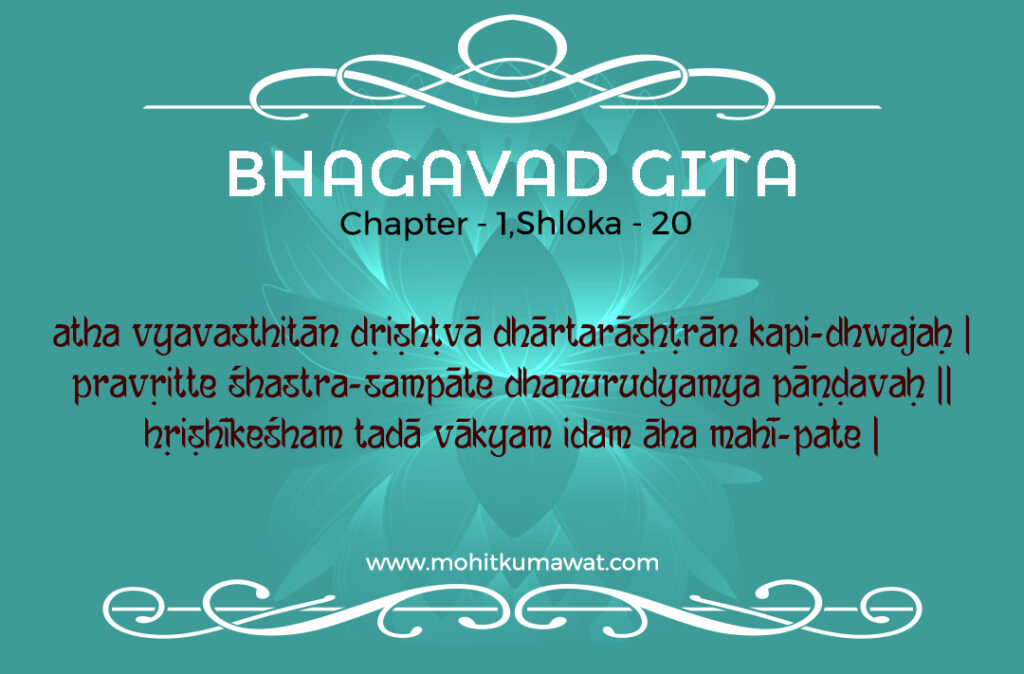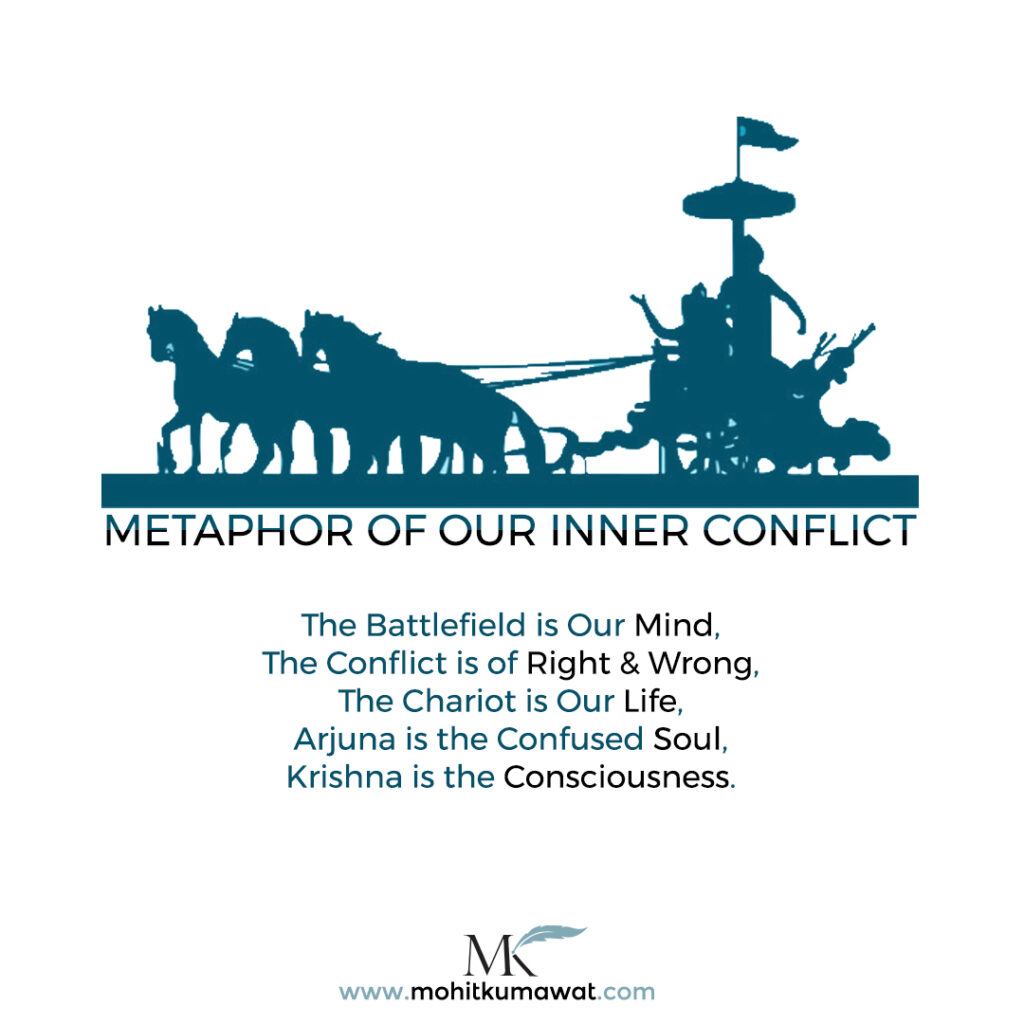
Bhagavad Gita – Chapter 1, Verse 20
Bhagavad Gita – Chapter 1, Verse 20
TRANSLATION
TRANSLATION
At that time, Arjuna, the son of Pandu was seated in the chariot bearing a flag of Lord Hanuman; took his bow and was prepared to shoot the arrows. O King, after briefly looking at your sons in military array, Arjuna said these words to Hrishikesh.
At that time, Arjuna, the son of Pandu was seated in the chariot bearing a flag of Lord Hanuman; took his bow and was prepared to shoot the arrows. O King, after briefly looking at your sons in military array, Arjuna said these words to Hrishikesh.
PARAPHRASE
PARAPHRASE
Hanuman assisted Lord Rama in his war against Ravana, the demon king of Lanka. This verse of the Gita mentions Hanuman present as the emblem on the flag of Arjuna’s chariot, another sign of victory. And the presence of both Lord Rama and Hanuman on Arjuna’s chariot is a sure sign of success.
Yet when the war is about to begin, Arjuna’s eyes fall on his cousins assembled in military array in front of him. The particular scene is used as a metaphor for a man’s life. We are the Arjuna, riding the chariot (living our lives) with reins in the hands of Krishna. He is always present as Consciousness within us. Yet, we are so severely engaged in worldly affairs that we regard them as the ultimate reality of our existence.
Hanuman assisted Lord Rama in his war against Ravana, the demon king of Lanka. This verse of the Gita mentions Hanuman present as the emblem on the flag of Arjuna’s chariot, another sign of victory. And the presence of both Lord Rama and Hanuman on Arjuna’s chariot is a sure sign of success.
Yet when the war is about to begin, Arjuna’s eyes fall on his cousins assembled in military array in front of him. The particular scene is used as a metaphor for a man’s life. We are the Arjuna, riding the chariot (living our lives) with reins in the hands of Krishna. He is always present as Consciousness within us. Yet, we are so severely engaged in worldly affairs that we regard them as the ultimate reality of our existence.
Message for the Modern Generation
Message for the Modern Generation
The Gita wasn’t just recited by Lord Krishna to remind a prince of his duties. The Mahabharata War was the last conflict of the Vedic era and was supposedly meant to mark the end of one epoch of the Hindu belief system. In a changing era preaching the ancient knowledge in a more acceptable way became necessary. Hence, it is even more relatable to our present lives than any other scripture.
We are the Arjuna caught in between a continuous conflict of right and wrong. In our day-to-day lives, we come across choices between right and wrong. Each time we face them, we are as confused as Arjuna. Although Arjuna is shown as fighting, the reins of his chariot are in Krishna’s hands. This means our lives are too driven by our consciousness, and all we can do is perform the actions we are supposed to do.
The Gita wasn’t just recited by Lord Krishna to remind a prince of his duties. The Mahabharata War was the last conflict of the Vedic era and was supposedly meant to mark the end of one epoch of the Hindu belief system. In a changing era preaching the ancient knowledge in a more acceptable way became necessary. Hence, it is even more relatable to our present lives than any other scripture.
We are the Arjuna caught in between a continuous conflict of right and wrong. In our day-to-day lives, we come across choices between right and wrong. Each time we face them, we are as confused as Arjuna. Although Arjuna is shown as fighting, the reins of his chariot are in Krishna’s hands. This means our lives are too driven by our consciousness, and all we can do is perform the actions we are supposed to do.

Interpreting Gita As It Is
One might think that the idea of leading a life in such a way cannot be this simple. Totally agree. It isn’t but only because we make it complicated. Like Arjuna, who is very well aware of right and wrong, yet his mind is overcome by his attachment to the materialistic world. We are also the same, the consciousness within guides us, yet the looming deceptions of the material world are so strong that it becomes nearly impossible to instill our minds.
The deceptions or the Maya of our material world can be so empowering that they can stray us away from the path of our actions. We will see in the next verses that a warrior such as Arjuna becomes willing to lay down his bow and arrow. To show us that even such a dutiful warrior can be so affected by the materialistic world that even the God present in front of him needs 700 verses to bring clarity to his mind. We can not even imagine how difficult it can get for us to adopt the wisdom of the Gita. The best we can do is try.
One might think that the idea of leading a life in such a way cannot be this simple. Totally agree. It isn’t but only because we make it complicated. Like Arjuna, who is very well aware of right and wrong, yet his mind is overcome by his attachment to the materialistic world. We are also the same, the consciousness within guides us, yet the looming deceptions of the material world are so strong that it becomes nearly impossible to instill our minds.
The deceptions or the Maya of our material world can be so empowering that they can stray us away from the path of our actions. We will see in the next verses that a warrior such as Arjuna becomes willing to lay down his bow and arrow. To show us that even such a dutiful warrior can be so affected by the materialistic world that even the God present in front of him needs 700 verses to bring clarity to his mind. We can not even imagine how difficult it can get for us to adopt the wisdom of the Gita. The best we can do is try.
